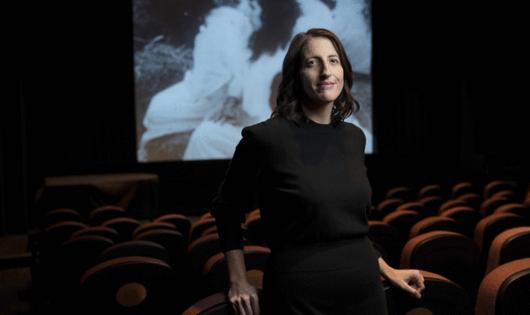Michael Phillips: A Chicago film curator reflects on her new job in London, where national arts funding is still a thing
Published in Entertainment News
CHICAGO — Across two decades, the film programmer Rebecca Fons, soon departing the Siskel Film Center in Chicago for a big new job at London’s Barbican Centre, has worked at a novel variety of movie venues, including the single-screen Iowa Theater in her hometown of Winterset, Iowa, population a little more than 5,000.
Most towns that size haven’t had a movie theater for years. Fons and her mother, Marianne Fons, raised a million bucks and rehabbed and reopened the Iowa Theater on John Wayne Drive in Winterset as a nonprofit.
Fons, 43, has been the Siskel Film Center’s director of programming since 2021. She will continue to program the Iowa when she becomes Head of Cinema at the sprawling Brutalist multidisciplinary Barbican arts complex this summer. The Barbican, by many measurements, remains London’s leading cultural destination; it’s home base for, among other organizations, the Royal Shakespeare Company and the London Symphony Orchestra. And it is generally tagged as the largest arts center in Europe.
Our conversation has been edited for clarity and length.
Q: In your job interviews for the Barbican post, what seemed to be the X-factor in your hiring?
A: I think it had a lot to do with a noticeably varied career. I worked at the Chicago International Film Festival for nearly a decade, I did educational screenings, worked with students, teachers, general audiences, I managed volunteers, handled the visiting talent, ran around red carpets. I rehabbed a cinema with my mom and popped popcorn and picked carpet patterns.
For FilmScene in Iowa City (a three-screen operation that Fons ran from 2017 to 2020), I programmed for rural audiences, college audiences. Here at the Film Center, I program for urban audiences. I guess (the Barbican) saw all this, and saw in me a curiosity to learn more, and always collaborate. How can we do more with film, to go beyond the frame? That kept coming up in our interviews, and that aligned with what the Barbican has been doing with all its cross-disciplinary and inter-disciplinary programming. They’ve always done it, but they’re entering a new era with it.
Q: It’s interesting to read a culture job description issued by a major institution in 2025 that isn’t afraid of words like “diverse” or “provoke debate.” We talked earlier this year about the zeroing out of the National Endowment for the Arts and how it could affect Film Center programming like the Black Harvest Film Festival. A few months later, everyone’s hurting.
A: Yeah. (pause) The core values of the Barbican, and the mission and the support of the nation the Barbican happens to be part of — they’re very welcome right now. Just to know there will be no debates about the value of national arts funding, very welcome. The Barbican’s strategic plan and its mission align with my own values as a curator and as a human being. The (head of cinema) job is why I’m going, and I’m honored to be in that role. The rest of it is icing on the cake, but it’s not just icing, if you know what I mean.
What’s interesting is that the Film Center’s programming and the Barbican’s programming have a lot of similarities. They run new films, we run new films. They host the London Palestine Film Festival, we host the Chicago Palestine Film Festival. They host various partner festivals’ screenings, we do the same. They showcase a lot of repertory titles, as do we. Also, this is sort of wild: The Barbican opened in 1982, three months before I was born (laughs).
Q: Has anyone there asked you where Iowa is? Do they believe it exists?
A: Um (laughs), you’re right, I should probably cue up a screening of “Field of Dreams” for the staff and just say “I live near there.” Honestly, I’ll just show them photos of the Iowa Theater in my hometown. We’re all connected by this business we love.
Q: Your successor at the Film Center, whoever that turns out to be — what advice would you give to this person about the challenges and the possibilities?
A: Every film exhibitor or curator or programmer is just trying to read the tea leaves and adjust. As usual. After the pandemic lockdown, and then the fallout from the (writers and actors) strikes, the industry was adjusting and counter-adjusting, trying to figure things out. It’s a dance marathon, and we’re all a bit tired. But we’re here. There’s a lot of encouragement and support and courage. We’re all in it. People have been predicting the death of cinema since not too long after the birth of cinema. We just keep doing what we do. It’s a resilient art form.
———
(Michael Phillips is the Chicago Tribune film critic.)
———
©2025 Chicago Tribune. Visit chicagotribune.com. Distributed by Tribune Content Agency, LLC.













Comments